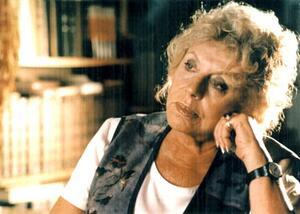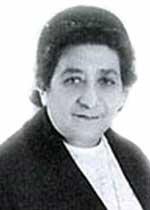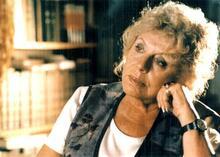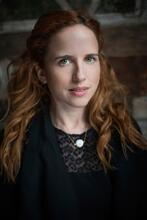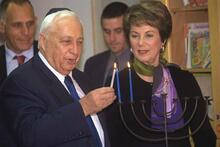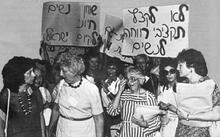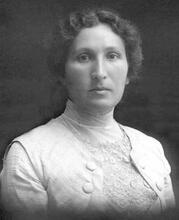Shulamit Aloni
Passionate, principled, provocative, and above all path breaking, Shulamit Aloni (shown here in 2001) has dedicated her life to transforming Israel into an open, just and liberal society based on human dignity, tolerance for diversity and equality. Since the 1950s, she has been a major player in the struggle for progressive stances on human rights, civil rights, religious pluralism, the status of women and Israeli-Palestinian relations.
Photographer: Yizhak Elhadar, "Scoop 80"
Institution: Shulamit Aloni
Born in Poland, Shulamit Aloni grew up in Tel Aviv and from an early age asserted her independence of thought and spirit. She received a teaching certificate just before Israel's independence in 1948. Following the war, she started teaching, hosted radio shows, earned a law degree, and become a champion of individual rights, women's rights, and religious freedom. In 1970, after one term as a member of the Knesset on behalf of Alignment (now the Labor party), she established her own political party (Ratz, which later became Meretz)—a progressive party dedicated to combatting discrimination and religious coercion, protecting civil liberties, and promoting peace. She was instrumental in changing the public agenda and discourse, leaving a legacy of humanism and commitment to the development of a just society in an Israel at peace with its neighbors.
Passionate, principled, provocative, and above all pathbreaking, Shulamit Aloni has left perhaps a greater imprint on Israeli political life and public discourse than any woman to come of age after Israel’s independence. If the country’s only female prime minister, Golda Meir, was the last of the pre-state Zionist-socialist establishment, Aloni (known to her friends as Shula) emerged as the high priestess of individual, civil, and human rights. She dedicated herself to transforming Israel into an open, just, and liberal society based on the principles of human dignity, tolerance for diversity, and full equality for all its citizens living in peace with their neighbors.
Family and Education
Shulamit (née Adler) was born on December 28, 1927, in Poland, although she herself and some sources often suggested other versions of her place and date of birth. She spent her childhood in Tel Aviv, where she received her primary school education. Raised by an overworked father and often-absent mother, she learned to fend for herself from an early age—a trait that became even more prominent when her parents joined the British army in World War II, dispatching her to the Alumot youth cooperative and then to the Ben Shemen youth village, after her younger brother Mordechai's tragic drowning there at the age of thirteen. During these years she developed her love not only for the Hebrew language and its biblical roots, but also for mathematics and for social involvement. She completed secondary school in the Beit Ha-Kerem High School in Jerusalem and then continued her undergraduate studies at Beit Ha-Kerem Teacher’s Training College (now the David Yellin Teachers’ College). While a student, Shulamit Adler joined the Palmah, the breeding ground of the Labor party (Mapai) elite, serving in its ranks in 1947 and during Israel's war of independence in 1948, during which her partner of three years, Mordechai Lipkin, was killed.
Immediately afterwards, armed with a degree in education, Aloni returned to Tel Aviv, where she began to teach, first in a school for immigrant children she helped found in Ramle, and then in secondary schools in the Tel Aviv area. Although she specialized in teaching history and Jewish sources (hence her extraordinary capacity to quote lengthy biblical and Talmudic texts), she also began to study law, obtaining an LL.B. degree from the Hebrew University in 1955.
While still in her twenties and starting what was to become a public career that spanned over half a century, the young, attractive, and charismatic teacher, law student, and budding publicist met (and in 1952 married) Reuven Aloni (1919-1991), who proved a stalwart source of support throughout her career. The Alonis were among the first residents of Kfar Shmaryahu, where Aloni continued to live after Reuven’s death in 1991, in the same modest bungalow where they raised their three sons, Dror (b. 1953), Nimrod (b. 1956), and Ehud (b. 1959), and where her eight grandchildren were constant visitors.
Campaigner for Civil Rights
During the 1950s, the young Shula began to focus on what was to become her life-long pursuit: civil rights. She pioneered the introduction of citizenship studies into the school curriculum (under the rather awkward title “Procedures of Government and Jurisprudence”). Her book, The Citizen and His Country, first published in 1958, went through ten editions and became the standard text for generations of Israeli secondary school students. In 1957 she launched her journalistic career, hosting the popular radio program “Outside Office Hours.” An on-air citizens’ rights bureau, the program provided individuals with an opportunity to voice their grievances against official misconduct and foot-dragging and to demand restitution, an idea that Aloni later developed in 1965, after her election to the Knesset, into the office of the Government Ombudsman. She also designed a special radio show for women: “Know the Law” (Hakiri et ha-Hok). Becoming a regular columnist for Yediot Aharonot (the country’s leading daily) and the weekly women’s magazine, La-Isha, she developed a reputation as an articulate and relentless campaigner for people’s rights.
Election to the Knesset
By the early 1960s, Shulamit Aloni had gained the attention of the Mapai hierarchy, which decided to place her on the party slate for the 1965 parliamentary elections. In her first term in the Knesset, the only one during which she served as a Labor Party, then called the Alignment, deputy, she began her persistent efforts to create a constitution for Israel that would include a bill of rights guaranteeing basic human freedoms. To promote these objectives, as a member of the Constitution, Law and Justice Committee (on which she served throughout her extended parliamentary career, which spanned seven terms and 27 years), she formed and chaired the Basic Laws Committee in 1965. In her first term in office, while the country was still almost completely preoccupied with defense and economic development, Shula founded the Israel Consumer Council, which she headed during its formative years (1966–1970), and solidified her social-democratic agenda.
Shulamit Aloni’s fierce independence and sharp tongue did not sit well with her Labor party colleagues. She quickly fell out with Golda Meir, then the party’s secretary-general, who accused her of peddling an Israeli form of “liberal bourgeois egoism.” When Aloni, as was her wont, lashed back, Golda told her that in the Labor party “we don’t know what ‘I think’ means, we only know what ‘we’ think,” to which Shula responded, “I don't know what you think, but I do know what I think.” By the time the 1969 elections rolled around, in the heady years after Israel’s victory in the Six Day War, the two women who symbolized more than anyone else the old and new Israel were not on speaking terms. Aloni was unceremoniously dropped from the Labor party list.
Shula was not idle during her four years outside the Knesset. She set up the Bureau for Civil Rights, which dispensed legal aid and advice to citizens from all walks of life. Frequently called upon to help people, especially women, facing discrimination in the rabbinical courts, in 1970 she began organizing contractual civil marriages and encouraged couples wishing to bypass the orthodox monopoly on personal law to explore marriage possibilities outside the country. She fast became the foremost spokesperson in the struggle against religious coercion. Her book, The Arrangement: From a State of Law to a State of Religion, published in 1970, set the tone for the still ongoing campaign for religious pluralism in the country.
Ratz: Civil Rights and Peace Movement
In 1973 Aloni finally resigned from the Labor party and established the Civil Rights and Peace Movement, known as Ratz (meaning “run” or “runner”). She gathered around her a group of liberal lawyers, intellectuals, civil activists, and feminists. Riding on the wave of discontent following the Yom Kippur War, her list unexpectedly garnered three seats in the Eighth Knesset, making her the first Israeli woman to successfully found a political party in Israel. She remained the leader of Ratz—which later merged with the smaller Mapam and Shinui factions in 1992 to form the Meretz (meaning “energy”) party—until her retirement at the end of the 13th Knesset in 1996.
During the twenty-three years that she headed Ratz-Meretz, Shulamit Aloni spearheaded virtually every progressive democratic cause in the country. Guided by her vision that human rights stand at the center of contemporary society and must be applied equally to all citizens regardless of gender, religion, nationality, age, and political persuasion, she fought relentlessly to advance the rights of children, women, and minorities in Israel. She not only laid down Israel’s human rights agenda—thereby altering the content of political debate in the country—but she continued to be a source of constant innovation, being the first to promote the struggle not only for LGBTQ rights, migrant workers, the handicapped, and conscientious objectors, but also for the creation of a Palestinian state alongside Israel.
These positions placed Aloni and her Ratz faction squarely at odds with the ruling coalition, first with the Labor party (although she did serve as a Minister without Portfolio for a few months in the first Rabin government in 1974, resigning over settlement policy in the West Bank and Gaza) and, after 1977, with the Likud. Her movement, nevertheless, continued to thrive. After a poor showing in the 1977 elections, when she alone was returned to the Knesset, the party expanded steadily. Fortified by Ran Cohen of the radical Sheli list, who joined Ratz in 1981, and Yossi Sarid, who resigned from the Labor party following the Israel invasion of Lebanon in 1982, the party gained three seats in 1984, and in 1988 recorded its best independent showing, when five of its members were elected to the Knesset.
During the course of the 1980s Shulamit Aloni consolidated her progressive platform. Besides her continuous concern with issues of civil rights, the status of women, and religious freedom, Aloni and her colleagues in Ratz became the spokespeople for the fledgling peace camp in Israel. She not only joined the campaign against settlement activity, but also openly advocated direct negotiations with the Palestinian Liberation Organization and withdrawal from the territories occupied by Israel in 1967. One of the founders of the International Center for Peace in the Middle East in 1982, she served as a member of its Executive Committee. In this capacity, she participated in the first meetings with representatives of the PLO held in Paris and Cairo in 1988 and in New York in 1989. During the first Palestinian intifada (1987–1993), she emerged as one of the strongest voices decrying the expansionist policy of the Likud-led government and advocating for the protection of the fundamental human and political rights of the Palestinian people.
The 1992 elections, the first time that the Meretz coalition presented a unified slate to the electorate, proved a phenomenal success for Aloni and her party. With the support of a bevy of youthful voters looking for a new voice (many of whom were graduates of the Ratz youth movement), Meretz won twelve seats in the Knesset and was asked to join the second Rabin government (1992–1995). Shulamit Aloni became Minister of Education and was accompanied by Amnon Rubinstein as Minister of Communications, Yair Tzaban as Minister of Immigrant Absorption, and Yossi Sarid as Minister of the Environment.
The first year of Meretz in office was not a happy one for Shulamit Aloni. Although she was delighted with her assignment in the Education Ministry, her coalition partners from the ultra-orthodox Shas party, who could not countenance her avowed secularism, pounced on her every word. In early May, after a public spat with the spiritual leader of Shas, Rabbi Ovadiah Yosef, Shas demanded her resignation from the Ministry of Education. Aloni found herself under pressure from her fellow ministers and from the Meretz parliamentary faction which, with one notable exception, urged her to give up the Education portfolio for the sake of coalition stability. She reluctantly acquiesced, changing places with Amnon Rubinstein in the Ministry of Communications in early June 1993, when she also became Minister of Science and Culture. But she was never the same. Her leadership within Meretz had been challenged, mostly by her impatient heir-apparent, Yossi Sarid, and she quickly lost her appetite for the internal politics of the movement she had founded.
Aloni nevertheless continued to make her mark on Israeli society. As Minister of Communications she opened the airwaves to competition and successfully spearheaded the cellular revolution in the country. As Minister of Culture, she promoted the performing arts and guided Israel through an extraordinary period of artistic innovation, hardly surprising given the fact that she was always a voracious reader and theater aficionado who counted most of Israel’s creative artists among her close personal friends. Most importantly, she accompanied the Oslo process from its early days, becoming one of its most vocal and consistent advocates.
The assassination of Yitzhak Rabin in November 1995 affected her deeply. While Aloni continued to carry out her ministerial duties, she found herself increasingly at odds both with his replacement, Shimon Peres, and with many of the people she had recruited to Meretz. She therefore decided not to seek another term, retiring from the Knesset on the eve of the 1996 elections and distancing herself from the new Meretz leadership under the aegis of Yossi Sarid.
Later Life and Honors
Aloni, however, never left the public arena during her lifetime. She continued to speak out—even more pointedly than in the past—primarily against Israeli violations of Palestinian human rights and for a just two-state solution. She remained a leading voice in the quest for the separation of religion and state in Israel. She carried immense cachet, justifiably, in feminist circles. And she was uncompromising in her ongoing effort to equip Israeli citizens with a Bill of Rights. Increasingly concerned with the headway made by messianic and ultra-nationalist elements in Israeli society and frustrated by what she considered to be the lack of backbone of her successors, during her waning years Shula became, if possible, an even more acerbic critic of the direction of Israel's trajectory after the collapse of the Oslo process and the outbreak of the second intifada in 2000.
After 1996 Shulamit Aloni also gave courses at Ben-Gurion University, Tel Aviv University, Princeton University, the Interdisciplinary Center in Herzliya, and the Academic College of Tel Aviv-Yafo. Until shortly before her death, she continued to play tennis, attend the opening nights of most new productions, travel widely throughout the world, write extensively in the Israel press, and appear regularly on radio and television, providing the most lucid voice in Israel for human rights, social justice, and civil liberty
Shulamit Aloni's achievements were widely recognized in Israel and abroad. She was the recipient of the Kreisky Prize for Human Rights (1985), the Decoration of Honor from the International Academy of Humanism (1996), the Certificate of Honor of the Association for Civil Rights in Israel (1998), and the Israel Prize for her lifetime contribution to Israeli society (2000). She was awarded honorary doctorates by Hebrew Union College (1991), Konkun University in South Korea (1994), the Free University of Brussels (1997), the Weizmann Institute of Science (1999), Ben-Gurion University in the Negev (2000), and Haifa University (2013).
Shulamit Aloni passed away on January 24, 2014, at the age of 86 in her home in Kfar Shmaryahu.
Selected Works
In Hebrew
The Citizen and His Country. Tel Aviv: Ma'arachot, 1958.
Children’s Rights in Israeli Law. Tel Aviv: Culture and Education, 1964.
The Arrangement: From a State of Law to a State of Religion. Tel Aviv: Otpaz, 1970.
Women as Human Beings. Jerusalem: Mabat, 1976.
With Idit Zertal. I Can Do No Other (Ani Lo Yekhola Aheret): A Political Biography of Shulamit Aloni. Or Yehuda: Ma'ariv-Hed Artzi, 1997.
Democracy in Shackles (Democratia Be'azikim), Tel Aviv: Am Oved, 2008.

